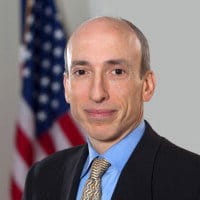FLASH FRIDAY is a weekly content series looking at the past, present and future of capital markets trading and technology. FLASH FRIDAY is sponsored by Instinet, a Nomura company.
Gary Gensler is generally considered an active regulator, inclined to oversee markets more stringently than your average U.S. Securities and Exchange Commission Chair.

In his first major industry speech this week, delivered less than two months after being sworn in, he did nothing to dispel that notion.
Speaking at Piper Sandler’s Global Exchange & FinTech Conference, Gensler outlined an ambitious, multi-pronged review of equity markets.
Gensler covered the ascendance of ‘wholesalers’, large electronic market making firms that execute almost 40% of U.S. equity trading volume; payment for order flow, perhaps the most controversial practice in markets today; the ‘gamification’ of trading promoted by some retail brokerage platforms; best execution in the context of the national best bid and offer (NBBO); and central clearing, specifically the idea to compress settlement from two days to one or even zero.
The bottom line was a familiar refrain from regulators: markets have changed, and we have not kept up.
“We are often relying on rules written in an earlier period. Rules mostly adopted 16 years ago do not fully reflect today’s technology,” Gensler said. “I believe it’s appropriate to look at ways to freshen up the SEC’s rules…The question is whether our equity markets are as efficient as they could be, in light of the technological changes and recent developments.”
Some of what Gensler said was old hat: payment for order flow, for example, has been under some type of regulatory review since Moses parted the Red Sea (or it least it seems that way). And other material was fairly straightforward and also no shocker: no, a retail brokerage platform should not game-ify its UX to lure newbie traders in to what has the possibility to be a very un-fun, money-losing experience.
Of the range of equity-market issues that Gensler covered, the bit on wholesalers — including their relative under-regulated status compared with lit exchanges, and their market concentration that potentially undermines competition — was probably the most significant, and the most impactful news to the market. The stock of Virtu Financial dropped 7.7% on June 9, with about triple the trading volume of previous days.
Beyond the specifics of Gensler’s remarks, market observers are watching his tone and posture, and the tea leaves from that say more regulation is ahead.
So what are ‘next steps’?
Nothing anytime soon, except possibly the burning of some midnight oil at the SEC, as Gensler has asked staff for recommendations on the issues he outlined. That would be followed by proposals and public comments, and then for what may move forward, rules would be established and enforced. But it’s reasonable to expect some proposals by the fall, if not sooner.




